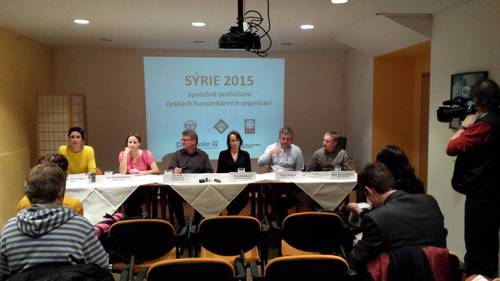The Czech Republic should be more involved in resolving the humanitarian crisis of exceptional dimensions in the Middle East region. More resources should be directed to Syria where it is possible to effectively help IDPs, and to help relieve giant waves of refugees fleeing into surrounding countries.
 The influx of refugees is an enormous burden for Turkey, Lebanon, and Jordan and significantly influences their local economic situations. Therefore, our aid should also be aimed into these countries. The investment in Iraq should go to long-term support of people who are fleeing the violence caused by the so-called Islamic State. In addition to helping in affected areas, the Czech Republic should also adopt a significantly higher number of Syrian refugees, beyond what has so far been pledged.
The influx of refugees is an enormous burden for Turkey, Lebanon, and Jordan and significantly influences their local economic situations. Therefore, our aid should also be aimed into these countries. The investment in Iraq should go to long-term support of people who are fleeing the violence caused by the so-called Islamic State. In addition to helping in affected areas, the Czech Republic should also adopt a significantly higher number of Syrian refugees, beyond what has so far been pledged.
Shortly before the 4th anniversary of the beginning of the Syrian conflict, which falls on Sunday March 15, representatives of the ADRA organisation, People in Need, Diaconia ECCB – Centre of Humanitarian and Development Cooperation, Caritas Czech Republic and Doctors without Borders agreed on this statement. All of these organisations operate long-term in this region and their statement is based on their own experiences.
According to the UNHCR 3.8 million people fled Syria to neighbouring countries, of whom 1.6 mil fled to Turkey, 1.2 mil fled to Lebanon and 0.6 mil fled to Jordan. Since last year Iraq has faced a huge movement of people, Syrians and Iraqis, who are trying to escape from the so called Islamic State, also called Daesh. At this moment, there are 2.47 million displaced persons on its territory. Another 7.6 mil IDPs live inside Syria itself.
“More than half of the population of Syria, of which at least 5 million are children, is in need of humanitarian aid. Formerly functional health system fell apart, there is a lack of qualified workers, drugs and other medical material. The security situation prevents humanitarian organisation from effectively providing help,” said Pavel Gruber, the director of Czech branch of Doctors without borders.
“In Lebanon, for example, there is a Syrian refugee for every fourth person. It’s as if the whole Czech Republic suddenly fled to Poland. Almost four million people fled into neighbouring countries. That is, for example, the population of Croatia,” said Jitka Škovránková, the coordinator of Syrian programmes of People in Need. Four years of the conflict brought Syria two decades back in development. “Syria is now being mentioned solely in connection with the so-called Islamic State. But many more are victims of the fight between the Asad regime and opposition,” adds Jitka Škovránková.
“More than 2 million Palestinian refugees live in Jordan. Another approximately 800,000 refugees have come from Syria and Iraq. This means that over 40 % of the population of Jordan are people who doesn’t feel like they are home,” described the situation in Jordan Jan Dus, the director of HR centre of Diaconia ECCB.
“Roughly 3 million Syrian children of school age cannot visit school. Schools are either ruined or used as a shelter for refugees. About a fifth of them have stopped working. More than 50 % of children have had school attendance interrupted. The opportunities for education of children are also poor in neighbouring countries. For example, in Jordan more than half a million children simply do not go to school,” said Kateřina Piechowicz, the spokeswoman of the humanitarian organisation ADRA.
“Over the last twelve months almost 100,000 refugees came from Syria to the European Union. They are the largest group of current migrants – one in five asylum seekers is Syrian. Only a small number come to the Czech Republic. Last year only 108 Syrians applied for asylum. Generous recipients of Syrian refugees are Germany and Sweden,” said Klára Boumová, the coordinator for migration from Caritas Czech Republic.
“In light of such a desperate humanitarian situation in the Middle East, we consider the attitude of the Czech Republic towards acceptance of Syrians into our territory scandalous. The Czech Republic should, as one of the forty richest countries in the world, fulfil their responsibilities and accept a significantly higher number of most vulnerable refugees into its territory. We are aware of the fact, that such decision is not crucial for resolving the conflict in the Middle East, but we consider it as a sign of solidarity for a country which has itself sent hundreds of thousands of refugees into the world during its history,” agreed representatives of all organisations.







